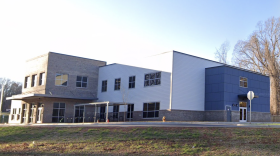Lawmakers are drafting athat would allow charter schools to take over five of the state’s lowest-performing elementary schools. The bill’s main sponsor, Rep. Rob Bryan (R-Mecklenburg) wants lawmakers to approve the takeover legislation in the short session. But Bryan is championing the proposal, despite research showing a similar charter takeover in Tennessee had minimal impact on student performance.
In 2012, Tennessee lawmakers took a few of the state’s lowest-performing schools and put them in an "Achievement School District" (ASD). ASD schools are either turned over to charter management organizations, or put under the management of the ASD superintendent, who operates them like charter schools.
Three years into the program, Vanderbilt University researcher Gary Henry and found that the program had little effect on student outcomes.
"Our conclusion is that the schools in the ASD are doing about the same as the schools that weren’t taken into any systemic reform," Henry told lawmakers last Wednesday.
"I would like to create an environment where they [charter management organizations] are interested in coming to North Carolina."
Henry presented his findings to a legislative committee looking into starting an ASD in North Carolina. Henry’s research found that after three years, students in ASD-run schools did hardly any better on state tests than students in other low-performing schools. Students in ASD schools run by charter management organizations didn’t do any better at all than other low-performing schools.
Despite Tennessee’s results, Representative Rob Bryan says he still finds the idea of an ASD appealing. He says it's a way to attract more charter schools to the state’s low-income communities.
"I would like to create an environment where they [charter management organizations] are interested in coming to North Carolina, whether it’s through an ASD or partnering," Bryan said in an interview after the meeting.
"But I think if you don’t get them in here and get them started you won’t have an opportunity to see what they’re able to do."
The Charlotte representative says he thinks given more time, the ASD will be successful in Tennessee. And he says he thinks North Carolina can make it work better if the state is more selective than Tennessee in choosing charter operators.
"Some of them are not as good as others," he said, "and so I would say, part of what we did in our bill is putting some guardrails on to try to make sure we were getting the best of the best."
"We're concerned that the research on ASDs is not pointing in a clearly positive direction."
Bruce Mildwurf, a lobbyist for the , was skeptical. During a public comment period, he noted that charter schools that have been successful as schools of choice may not see the same results when they take over a neighborhood school, as they have to in an ASD. He quoted Tennessee’s former ASD superintendent Chris Barbic, who resigned in 2015:
“'Achieving results in neighborhood schools is harder than in a choice environment....I think that the depth of the generational poverty and what our kids bring into school every day makes it even harder than what we initially expected. We underestimated that.'”
A second researcher addressing the committee, from George Washington University, made a similar point.
"These are charters that take over neighborhood schools. That is not the way that charter schools were meant to operate. That’s a different idea of charter schools," he explained.
Glazer explained unlike most charters, ASD charters can’t rely on being able to control their enrollment or on active parent choice.
"Charters usually have the advantage of having parents who know what the school is about, know what the philosophy is, and have opted in. You have more buy-in and often more parent engagement," he told the committee.
Matt Ellinwood with the left-leaning North Carolina Justice Center had concerns Bryan was moving forward with the proposal.
"We're concerned that the research on ASDs is not pointing in a clearly positive direction," he said.
Henry’s research did show a clear positive outcome from one provision of Tennessee’s program that Bryan added to his latest draft of the bill. It’s a measure that would encourage school districts to give low-performing schools charter-like flexibility. These are known as "Innovation Zone" or iZone schools, and Henry’s research shows that in Tennessee, those schools had really good results. In fact, they blew way past ASD schools.
"The effect of the iZone is functionally equivalent to a ten-student per class reduction in class size," Henry told the committee. "These effects are what we consider in education large and significant."
Bryan notes that since 2010, North Carolina school districts have had an option to run low-performing schools with charter-like freedoms almost identical to those of iZone schools. No districts have yet taken advantage—though Alamance and Wake County Schools have both expressed interest in recent months.
"You have to have a state takeover threaten to create an iZone, I think. I think that’s part of the reality," Bryan said. "They [Tennessee school districts] did not create them without the threat of the state takeover. So I think that kind of hammer is needed."
It’s important to note that while Bryan’s ASD bill includes the iZone, it does not come with the huge investment in Federal Race to the Top grants and private investment, which totaled hundreds of millions of dollars. Bryan said his bill would come with about $1 million a year to pay for salaries of the ASD superintendent and a few staff.
"Now, will there be other monies raised by the ASD super, or would that charter put seed money in itself to it? I think those are all very possible things," he said.
The North Carolina School Boards Association says the funds would be better spent on programs with proven results.
The ASD committee will vote April 13 on whether to move forward with the proposal in the short session.










